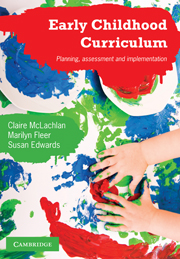Book contents
- Frontmatter
- Contents
- List of figures
- List of tables
- About the authors
- Acknowledgments
- Chapter 1 Introduction
- Chapter 2 Theory, research and the early childhood curriculum
- Chapter 3 Development and learning – how views of development shape how curriculum is framed
- Chapter 4 Curriculum as a cultural broker
- Chapter 5 Interpreting early childhood curriculum
- Chapter 6 Cultural-historical curriculum in action
- Chapter 7 Curriculum as a conceptual tool: Observation, content and programming
- Chapter 8 Assessing children and evaluating curriculum: Shifting lenses
- Chapter 9 Content knowledge: The sciences, maths and numeracy
- Chapter 10 Content knowledge: Language, literacy and ICT
- Chapter 11 Content knowledge: The arts and health, wellbeing and physical activity
- Chapter 12 Conclusions
- Index
Chapter 5 - Interpreting early childhood curriculum
- Frontmatter
- Contents
- List of figures
- List of tables
- About the authors
- Acknowledgments
- Chapter 1 Introduction
- Chapter 2 Theory, research and the early childhood curriculum
- Chapter 3 Development and learning – how views of development shape how curriculum is framed
- Chapter 4 Curriculum as a cultural broker
- Chapter 5 Interpreting early childhood curriculum
- Chapter 6 Cultural-historical curriculum in action
- Chapter 7 Curriculum as a conceptual tool: Observation, content and programming
- Chapter 8 Assessing children and evaluating curriculum: Shifting lenses
- Chapter 9 Content knowledge: The sciences, maths and numeracy
- Chapter 10 Content knowledge: Language, literacy and ICT
- Chapter 11 Content knowledge: The arts and health, wellbeing and physical activity
- Chapter 12 Conclusions
- Index
Summary
This chapter will refocus attention on the ideas examined Chapters 1 to 4, positioning teachers in relation to their centres or classrooms as cultural communities, their positions in the broader cultural community and their reading of early childhood education as a cultural practice. The ways in which teachers construct curriculum in relation to document, time, history and place will be explored. The need for teachers to actively engage in ongoing professional learning is highlighted.
REFLECTION 5.1
In this chapter, we will explore the issues raised by Gwendolyne and Kiri about the relationship between teachers' knowledge about child development and curriculum documents.
Gwendolyne: In Malawi, our curriculum is a guide to help the carers know more about children's development and what concepts they should be teaching.
Kiri: But what about this idea of it being constructed and contested – how does that work if we have a written curriculum?
Take a few moments now and think about your own view of how children learn. How does it relate to your local curriculum document?
Jill is a teacher who participated in a research project about teachers' interpretations of the early childhood curriculum (Edwards 2004). As part of this project Jill was asked to reflect on her understanding of the curriculum. Jill has worked in early childhood education for over 20 years and during this time developed an interpretation of curriculum which emphasises the relationships she sees between children's participation in their communities and their learning in the classroom.
- Type
- Chapter
- Information
- Early Childhood CurriculumPlanning, Assessment, and Implementation, pp. 63 - 76Publisher: Cambridge University PressPrint publication year: 2010



